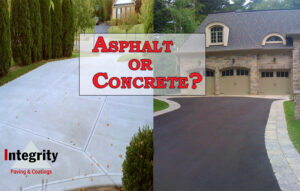 It’s time for you to install a new driveway or parking lot and the first question that comes to mind is: asphalt or concrete? Of course, there are advantages and disadvantages of each, so today we’ll look at the pros and cons of asphalt and concrete to help you make your decision.
It’s time for you to install a new driveway or parking lot and the first question that comes to mind is: asphalt or concrete? Of course, there are advantages and disadvantages of each, so today we’ll look at the pros and cons of asphalt and concrete to help you make your decision.
Asphalt
Asphalt pavement is a mix of stones, sand, and liquid asphalt cement. These components are heated and mixed together in exact proportions to create the right balance and consistency. It is added to a prepared base or subgrade while it is still hot. After this, the mixture cools and hardens quickly, and you can drive or park on it typically within 24 hours.
Pros of Asphalt
Cons of Asphalt
Concrete
Concrete is gravel that is mixed with water and cement. The surface of the ground is first properly prepared, to make sure it is even and compacted. Next, reinforcing steel bars are placed to add strength. Finally, the concrete is mixed and poured into place at a minimum thickness of four inches. It then dries and sets slowly – after about one week it is okay to drive and park on the concrete surface.
Pros of Concrete
Cons of Concrete
A final difference between asphalt and concrete is the appearance – asphalt is black and concrete is white (although it can be stained, tinted, or stamped with designs). Since beauty is in the eye of the beholder, the pros and cons of color will depend on your preferences. Asphalt and concrete each have unique advantages and disadvantages, so if you are trying to decide between the two, there is no right answer. Asphalt or concrete? Review the pros and cons in this article to make the choice that is right for you.
Integrity Paving & Coatings offers both asphalt paving and concrete paving, as well as all the maintenance and repairs you need to keep your paved surfaces in top shape. Once you have made your decision, give us a call at (512) 853-9009 for a free on-site consultation.
Schedule your free, on-site consultation and estimate today! Call Integrity Paving & Coatings at (512) 853-9009 or get your quote online.